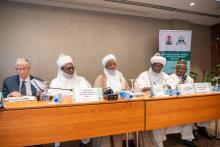WHO Reaffirms Commitment to Nigeria’s Health Goals
The World Health Organization (WHO) Country Representative in Nigeria, Dr. Walter Kazadi Mulombo, has reiterated the organization’s steadfast commitment to assisting the Nigerian government in its mission to eliminate all forms of polio transmission and enhance routine immunization efforts. This initiative is part of a broader strategy to establish a resilient healthcare system throughout the nation.
Dr. Mulombo made these remarks during the quarterly review meeting of the Northern Traditional Leaders’ Committee (NTLC) on Primary Health Care Service Delivery, held in Abuja and organized by the National Primary Health Care Development Agency (NPHCDA). He acknowledged the significant historical contributions of traditional and religious leaders in the fight against poliovirus in Nigeria.
Urging Continued Efforts
During the meeting, Dr. Mulombo emphasized the importance of the NTLC’s framework, which he described as essential for halting the transmission of the Circulating Variant poliovirus Type 2 (cVPV2) and improving overall Primary Healthcare (PHC) service delivery. He stated, “The committee has the most critical framework with the necessary resources to put a stop to the transmission of cVPV2 and ultimately achieve Universal Health Coverage for Nigerians.”
He expressed gratitude to the Nigerian government for fostering an environment conducive to the NTLC’s operations and assured that WHO would continue to support the development of the health workforce to strengthen the healthcare system.
Engagement with Local Governments
Dr. Mulombo also highlighted the recent affirmation of Local Government Authority (LGA) autonomy, noting that WHO has initiated discussions with the Amalgamation of Local Government of Nigeria (ALGON) leadership to enhance health system strengthening and human resources for health.
The Role of Vaccines
In a related statement, Professor Muhammad Ali Pate, the Coordinating Minister of Health and Social Welfare, underscored the vital role vaccines play in combating diseases, particularly in the face of misinformation and social media challenges. He praised the NTLC’s efforts over the past 15 years in expanding immunization and transforming primary healthcare in Nigeria, noting the successful eradication of the wild poliovirus as a significant achievement.
Professor Pate urged traditional leaders, especially those in border communities, to prepare for an upcoming immunization campaign in October, emphasizing the need for Nigeria to maintain its wild polio-free status.
Acknowledgment from Partners
Mr. Bill Gates, Co-founder of the Bill and Melinda Gates Foundation, also commended the NTLC for its progress in the fight against polio, despite facing challenges such as anti-polio sentiments and insecurity. He praised Nigeria’s achievement of 86% coverage in the HPV campaign, calling it one of the best globally.
The Emir of Arugungu, Chairman of the NTLC on polio eradication, along with the Sultan of Sokoto, Muhammadu Sa’ad Abubakar, reaffirmed their commitment to ensuring that every eligible child receives the polio vaccine and quality healthcare services. They called for additional funding from partners and urged the Minister of Health to continue providing the necessary support for the NTLC’s operations.
Traditional Leaders’ Impact on Public Health
In Nigeria, the success of public health initiatives relies heavily on trust, community engagement, and culturally appropriate strategies. Northern traditional and religious leaders have been pivotal in implementing vaccination campaigns and health education initiatives aimed at disease prevention. Their advocacy has significantly improved maternal and child health outcomes and increased routine immunization coverage, particularly in underserved areas. However, challenges remain, particularly in reducing the number of zero-dose children.
Through these collaborative efforts, Nigeria aims to strengthen its healthcare system and ensure that all citizens have access to essential health services.



